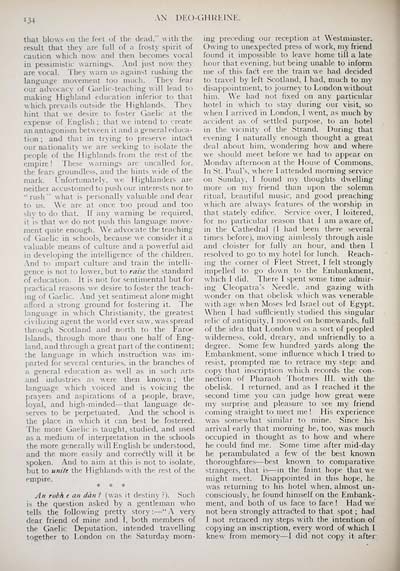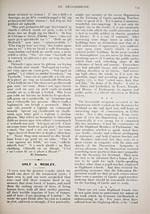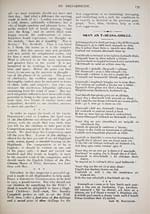Blair Collection > Deo-gréine
(158)
Download files
Complete book:
Individual page:
Thumbnail gallery: Grid view | List view

134
AN DEO-GHREINE.
thai blows "ii the feet of the dead," with the
result that they arc full <>f a frosty spirit of
caution which now and then becomes vocal
in pessimistic warnings. And just now they
are vocal. They warn us against rushing the
language movement too much. They tear
our advocacy of Gaelic-teaching will lead to
making Highland education inferior to that
which pre vails outside the Highlands. They
hint that we desire to foster Gaelic at the
expense of English; that we intend to create
an antagonism between it and a general educa-
tion; and that in trying to preserve intact
our nationality we are seeking to isolate the
people of the Highlands from the rest of the
empire! These warnings arc uncalled for,
the fear- groundless, and the hints wide of the
mark. Unfortunately, we Highlanders are
neither accustomed to push our interests nor to
"rush'" what is personally valuable and dear
to us. We are at once too proud and too
shy to do that. If any warning be required,
il is that we do not push this language move-
ment quite enough. We advocate the teaching
of Gaelic in schools, because we consider it a
valuable means of culture and a powerful aid
in developing the intelligence of the children.
And to impart culture and train the intelli-
gent e is not to lower, but to raise the standard
of education. It is not for sentimental but for
pracTii al reasons we desire to foster the teach-
ing oi Gaelic. And yet sentiment alonemight
afford a strong ground for fostering it. The
language in which Christianity, the greatest
civilizing agent the world ever saw, was spread
through Scotland and north to the Faroe
Islands, through more than one half of Eng-
land, and thr< nigh a great part of the continent;
the language m which instruction was im-
parted for several centuries, in the branches of
a general education as well as in such arts
and industries as were then known ; the
language which voiced and is voicing the
prayers and aspirations of a people, brave.
Loyal, and high-minded — that language de-
serves to be perpetuated. And the school is
the place in which it can best be fostered.
The- more Gaelic is taught, studied, and used
as a medium of interpretation in the schools
the more generally will English be understood,
and the more easily and correctly will it be
spoken. And to aim at this is not to isolate,
but to unite the Highlands with the rest of the
emplP .
* * *
An robh t an dim! (was it destinx ''.). Such
is the question asked by a gentleman who
tells the following pretty story :• — " A vm
dear friend of mine and I, both members of
the Gaelic Deputation, intruded travelling
together to London on the' Saturday morn-
ing preceding our reception at Westminster,
Owing to unexpected press of work, my friend
found it impossible to leave home till a late
hour that evening, but being unable to inform
mi' of this fact ere the train we had decided
to travel by left Scotland, I had, much to my
disappointment, to journey to London without
hi in. We had not fixed on any particular
hotel in which to stay during our visit, so
when I arrived in London, I went, as much by
accident as of settled purpose, to an hotel
in the vicinity of the Strand. During that
evening I naturally enough thought a great
deal about him, wondering how and where
we should meet before we had to appear on
Monday afternoon at the House of Commons.
In St. Paul's, where I attended morning service
on Sunday, I found my thoughts dwelling
more on my friend than upon the solemn
ritual, beautiful music, and good preaching
which are always features of the worship in
that stately edifice. Service over, I loitered,
lor no particular reason that I am aware of,
in the Cathedral (I had been there several
times before), moving aimlessly through aisle
and cloister for fully an hour, and then I
resolved to go to my hotel for lunch. Reach-
ing the corner of Fleet Street, I felt strongly
impelled to go down to the Embankment,
which I did. There I spent some time admir-
ing Cleopatra's Needle, and gazing with
wonder on that obelisk which was venerable
with age when Moses led Israel out of Egypt.
When I had sufficiently studied this singular
relic of antiquity, I moved on homewards, full
of the idea that London was a sort of peopled
wilderness, cold, dreary, and unfriendly to a
degree. Some few hundred yards along the
Embankment, some influence which I tried to
resist, prompted me to retrace my steps and
copy that inscription which records the con-
nection of Pharaoh Thotmes III. with the
obelisk. I returned, and as I reached it the
second time you can judge how great were
my surprise and pleasure to see my friend
coming straight to meet me ! His experience
was somewhat similar to mine. Since his
arrival early that morning he, too, was much
occupied in thought as to how and where
he could find me. Some time after mid-day
he perambulated a few of the best known
thoroughfares— best known to comparative
strangers, that is — in the faint hope that we
might meet. Disappointed in this hope, he
was returning to his hotel when, almost un-
consciously, he found himself on the Embank-
ment, and both of us face to face ! Had we
not been strongly attracted to that spot ; had
I not retraced my steps with the intention of
copying an inscription, every word of which I
knew from memory — I did not copy it after
AN DEO-GHREINE.
thai blows "ii the feet of the dead," with the
result that they arc full <>f a frosty spirit of
caution which now and then becomes vocal
in pessimistic warnings. And just now they
are vocal. They warn us against rushing the
language movement too much. They tear
our advocacy of Gaelic-teaching will lead to
making Highland education inferior to that
which pre vails outside the Highlands. They
hint that we desire to foster Gaelic at the
expense of English; that we intend to create
an antagonism between it and a general educa-
tion; and that in trying to preserve intact
our nationality we are seeking to isolate the
people of the Highlands from the rest of the
empire! These warnings arc uncalled for,
the fear- groundless, and the hints wide of the
mark. Unfortunately, we Highlanders are
neither accustomed to push our interests nor to
"rush'" what is personally valuable and dear
to us. We are at once too proud and too
shy to do that. If any warning be required,
il is that we do not push this language move-
ment quite enough. We advocate the teaching
of Gaelic in schools, because we consider it a
valuable means of culture and a powerful aid
in developing the intelligence of the children.
And to impart culture and train the intelli-
gent e is not to lower, but to raise the standard
of education. It is not for sentimental but for
pracTii al reasons we desire to foster the teach-
ing oi Gaelic. And yet sentiment alonemight
afford a strong ground for fostering it. The
language in which Christianity, the greatest
civilizing agent the world ever saw, was spread
through Scotland and north to the Faroe
Islands, through more than one half of Eng-
land, and thr< nigh a great part of the continent;
the language m which instruction was im-
parted for several centuries, in the branches of
a general education as well as in such arts
and industries as were then known ; the
language which voiced and is voicing the
prayers and aspirations of a people, brave.
Loyal, and high-minded — that language de-
serves to be perpetuated. And the school is
the place in which it can best be fostered.
The- more Gaelic is taught, studied, and used
as a medium of interpretation in the schools
the more generally will English be understood,
and the more easily and correctly will it be
spoken. And to aim at this is not to isolate,
but to unite the Highlands with the rest of the
emplP .
* * *
An robh t an dim! (was it destinx ''.). Such
is the question asked by a gentleman who
tells the following pretty story :• — " A vm
dear friend of mine and I, both members of
the Gaelic Deputation, intruded travelling
together to London on the' Saturday morn-
ing preceding our reception at Westminster,
Owing to unexpected press of work, my friend
found it impossible to leave home till a late
hour that evening, but being unable to inform
mi' of this fact ere the train we had decided
to travel by left Scotland, I had, much to my
disappointment, to journey to London without
hi in. We had not fixed on any particular
hotel in which to stay during our visit, so
when I arrived in London, I went, as much by
accident as of settled purpose, to an hotel
in the vicinity of the Strand. During that
evening I naturally enough thought a great
deal about him, wondering how and where
we should meet before we had to appear on
Monday afternoon at the House of Commons.
In St. Paul's, where I attended morning service
on Sunday, I found my thoughts dwelling
more on my friend than upon the solemn
ritual, beautiful music, and good preaching
which are always features of the worship in
that stately edifice. Service over, I loitered,
lor no particular reason that I am aware of,
in the Cathedral (I had been there several
times before), moving aimlessly through aisle
and cloister for fully an hour, and then I
resolved to go to my hotel for lunch. Reach-
ing the corner of Fleet Street, I felt strongly
impelled to go down to the Embankment,
which I did. There I spent some time admir-
ing Cleopatra's Needle, and gazing with
wonder on that obelisk which was venerable
with age when Moses led Israel out of Egypt.
When I had sufficiently studied this singular
relic of antiquity, I moved on homewards, full
of the idea that London was a sort of peopled
wilderness, cold, dreary, and unfriendly to a
degree. Some few hundred yards along the
Embankment, some influence which I tried to
resist, prompted me to retrace my steps and
copy that inscription which records the con-
nection of Pharaoh Thotmes III. with the
obelisk. I returned, and as I reached it the
second time you can judge how great were
my surprise and pleasure to see my friend
coming straight to meet me ! His experience
was somewhat similar to mine. Since his
arrival early that morning he, too, was much
occupied in thought as to how and where
he could find me. Some time after mid-day
he perambulated a few of the best known
thoroughfares— best known to comparative
strangers, that is — in the faint hope that we
might meet. Disappointed in this hope, he
was returning to his hotel when, almost un-
consciously, he found himself on the Embank-
ment, and both of us face to face ! Had we
not been strongly attracted to that spot ; had
I not retraced my steps with the intention of
copying an inscription, every word of which I
knew from memory — I did not copy it after
Set display mode to: Large image | Transcription
Images and transcriptions on this page, including medium image downloads, may be used under the Creative Commons Attribution 4.0 International Licence unless otherwise stated. ![]()
| Early Gaelic Book Collections > Blair Collection > Deo-gréine > (158) |
|---|
| Permanent URL | https://digital.nls.uk/76699431 |
|---|
| Description | A selection of books from a collection of more than 500 titles, mostly on religious and literary topics. Also includes some material dealing with other Celtic languages and societies. Collection created towards the end of the 19th century by Lady Evelyn Stewart Murray. |
|---|
| Description | Selected items from five 'Special and Named Printed Collections'. Includes books in Gaelic and other Celtic languages, works about the Gaels, their languages, literature, culture and history. |
|---|

